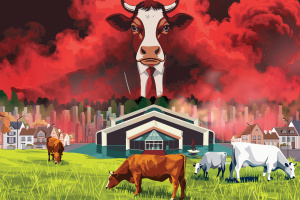High Steaks: How focusing on agriculture can ensure the EU meets its methane-reduction goals

Introduction
A new study shows that the EU could cut as much as 68% of its domestic methane emissions by 2030 if it implemented all the available mitigation measures across high-emitting sectors. The EU, as one of the instigators of the Global Methane Pledge, has committed to significantly reducing methane emissions by 2030. But a new study, undertaken by environmental consultancy CE Delft for the Changing Markets Foundation, concludes that it will be very difficult – if not impossible – to achieve this without introducing additional measures in the meat and dairy industries, which produce over half of domestic methane emissions. The study investigates the potential of methane reductions across different EU sectors. It found that the biggest methane reductions – up to 36% – could come from tackling emissions in the agriculture sector. This briefing summarises the main findings of the study and highlights key policy priorities that the EU should adopt now in the agriculture sector in order to realise significant methane reductions in line with its climate commitments.
PARTNERS






You might also like...

The New Faces of GWP*: Temperature neutrality and no additional warming
This briefing represents an update of Changing Market's Seeing Stars report (2023), based on FOI requests in Ireland, New Zealand, Europe and Northern Ireland.

Hot Money: 40 Financial Institutions are funding a climate-changing agri-methane footprint
This report focuses on the 20 investors and 20 banks that are funding the methane generating activities of 15 of the leading meat and dairy companies worldwide. Collectively these financial institutions fu...

The Meat Agenda: Agricultural Exceptionalism and Greenwash in Brazil
As Brazil prepares to host the 30th conference of the parties of UNFCCC (COP30) in heart of the Amazon, the country is positioning itself as a global climate leader with ambitious emissions reduction targets...